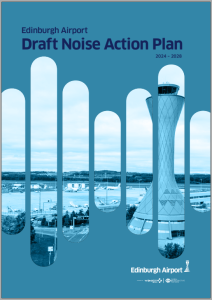Under the Scottish Government’s Environmental Assessment Act, airports must create or revise Noise Action Plans (NAPs) every five years.
Latest updates
Edinburgh Airport Noise Action Plan (NAP) 2024 – 2028
Edinburgh Airport is seeking your feedback on our draft Noise Action Plan, which sets out how we will manage and, where feasible, reduce the impact of aviation noise on communities around the airport and under our flight paths.
Noise Action Plans operate in five yearly cycles and the proposed Noise Action Plan will update and replace the 2018-2023 Noise Action Plan.
The consultation will run for 12 weeks, and once engagement with stakeholders and communities is complete, the Noise Action Plan will operate from 2024-2028.
Find out more and have your say before midnight, Friday 31st January 2025.
To take part and for more information and FAQs visit the dedicated webpage – Edinburgh Airport Noise Action Plan
You can find out further information on Maps and NAPs on the Scottish Government NAP webpage – Scottish Noise Maps and Action Plans
Useful links

Edinburgh Airport NAP 2024 – 2028 Consultation
Edinburgh Airport has opened the NAP 2024 – 2028 to public consultation. Follow the link to allow you easy access to the documentation and to contribute to the discussion.
Edinburgh Airport NAP Consultation about Edinburgh Airport NAP 2024 – 2028 Consultation
Scotland’s Noise
Every five years, the Scottish Government maps noise levels across Scotland, following EU regulations. These maps inform Noise Action Plans by Aviation, Road, Rail and Local Authorities to lessen noise impact, with public input on draft plans. In 2024, collaborative modelling will update noise exposure data for Scotland.
Scotland’s Noise webpage about Scotland’s NoiseRelevant documents
FAQs
Frequently Asked Questions about Noise Action Plans
NAPs are important because excessive noise can have significant negative impacts on human health and well-being, including sleep disturbance, stress, cardiovascular problems, and reduced cognitive performance. NAPs aim to protect communities from these harmful effects by reducing noise levels and minimising noise-related disruptions.
